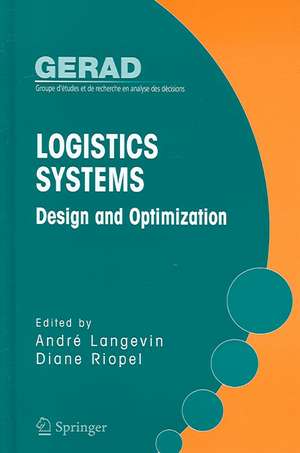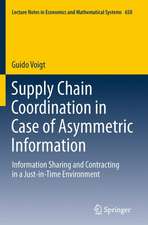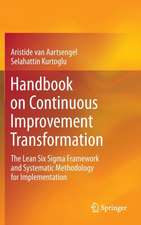Logistics Systems: Design and Optimization
Editat de Andre Langevin, Diane Riopelen Limba Engleză Hardback – 25 mar 2005
| Toate formatele și edițiile | Preț | Express |
|---|---|---|
| Paperback (1) | 702.24 lei 6-8 săpt. | |
| Springer Us – 29 oct 2010 | 702.24 lei 6-8 săpt. | |
| Hardback (1) | 958.25 lei 6-8 săpt. | |
| Springer Us – 25 mar 2005 | 958.25 lei 6-8 săpt. |
Preț: 958.25 lei
Preț vechi: 1168.60 lei
-18% Nou
Puncte Express: 1437
Preț estimativ în valută:
183.37€ • 196.08$ • 152.88£
183.37€ • 196.08$ • 152.88£
Carte tipărită la comandă
Livrare economică 17 aprilie-01 mai
Preluare comenzi: 021 569.72.76
Specificații
ISBN-13: 9780387249711
ISBN-10: 0387249710
Pagini: 387
Ilustrații: XX, 388 p.
Dimensiuni: 155 x 235 x 27 mm
Greutate: 0.81 kg
Ediția:2005
Editura: Springer Us
Colecția Springer
Locul publicării:New York, NY, United States
ISBN-10: 0387249710
Pagini: 387
Ilustrații: XX, 388 p.
Dimensiuni: 155 x 235 x 27 mm
Greutate: 0.81 kg
Ediția:2005
Editura: Springer Us
Colecția Springer
Locul publicării:New York, NY, United States
Public țintă
ResearchCuprins
The Network of Logistics Decisions.- Facility Location in Supply Chain Design.- Distribution Centres in Supply Chain Operations.- Operational Research Methods for Efficient Warehousing.- Models and Methods for Facilities Layout Design from an Applicability to Real-World Perspective.- The Design, Planning, and Optimization of Reverse Logistics Networks.- Models and Methods for Operations in Port Container Terminals.- Strategic Network Design for Motor Carriers.- New Heuristics for the Vehicle Routing Problem.- Routing Propane Deliveries.- Synchronized Production-Distribution Planning in the Pulp and Paper Industry.- Production Planning Optimization Modeling in Demand and Supply Chains of High-Value Consumer Products.
Recenzii
From the reviews:
"Langevin and Riopel cover the variety and the complexity of logistics activities in 12 chapters written by well-known researchers … . the book could be appropriate for graduate-level courses or for self-study by professionals in engineering, manufacturing, and production logistics. … I highly recommend the book to students and professionals who are not familiar with these topics … . In conclusion, Logistics Systems is an attractive book … that will be particularly useful as a reference for researchers, engineers, and graduate students." (Sergio Ubeda, Interfaces, Vol. 37 (2), 2007)
"Langevin and Riopel cover the variety and the complexity of logistics activities in 12 chapters written by well-known researchers … . the book could be appropriate for graduate-level courses or for self-study by professionals in engineering, manufacturing, and production logistics. … I highly recommend the book to students and professionals who are not familiar with these topics … . In conclusion, Logistics Systems is an attractive book … that will be particularly useful as a reference for researchers, engineers, and graduate students." (Sergio Ubeda, Interfaces, Vol. 37 (2), 2007)
Textul de pe ultima copertă
In a context of global competition, the optimization of logistics systems is inescapable. LOGISTICS SYSTEMS: Design and Optimization falls within this perspective and presents twelve chapters that well illustrate the variety and the complexity of logistics activities. Each chapter is written by recognized researchers who have been commissioned to survey a specific topic or emerging area of logistics. The first chapter, by Riopel, Langevin, and Campbell, develops a framework for the entire book. It classifies logistics decisions and highlights the relevant linkages to logistics decisions. The intricacy of these linkages demonstrates how thoroughly the decisions are interrelated and underscores the complexity of managing logistics activities. Each of the following chapters focus on quantitative methods for the design and optimization of logistics systems.
Some of the chapter topics include the following: The recent research on expanding facility location decisions in different supply chain contexts. The specific functions of a distribution center vis-à-vis the classical warehouse. A taxonomy of warehouse decision models in terms of efficient warehousing. Transportation and production planning of reverse logistics. The research on the operation of port container terminals is systematically examined. An assessment of the recent metaheuristics advances in the vehicle routing problem. An impact analysis of customer centricity, personalization, and collaboration verses the agility of network stakeholders using a comprehensive operations planning optimization model specifically for this product context of high-value products like vehicles, computers, equipment, etc. Chapter material draws liberally on case material and real world applications.
Some of the chapter topics include the following: The recent research on expanding facility location decisions in different supply chain contexts. The specific functions of a distribution center vis-à-vis the classical warehouse. A taxonomy of warehouse decision models in terms of efficient warehousing. Transportation and production planning of reverse logistics. The research on the operation of port container terminals is systematically examined. An assessment of the recent metaheuristics advances in the vehicle routing problem. An impact analysis of customer centricity, personalization, and collaboration verses the agility of network stakeholders using a comprehensive operations planning optimization model specifically for this product context of high-value products like vehicles, computers, equipment, etc. Chapter material draws liberally on case material and real world applications.
Caracteristici
Contains 12 chapters that illustrate the variety and complexity of logistics activities The reader can acquire in a condensed way the knowledge of several important areas of logistics













